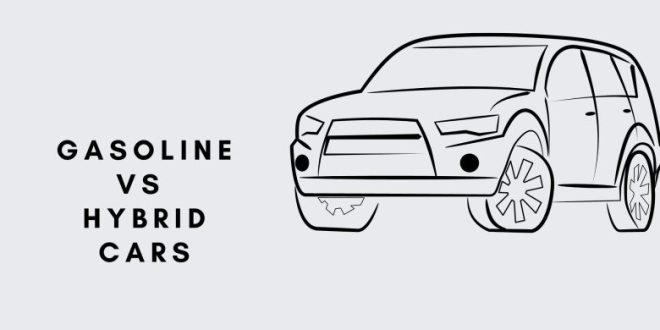Certain vehicles are both environmentally friendly and efficient at the same time. Most car buyers have to choose between a hybrid and a gas-powered vehicle.
Hybrid-powered cars, gasoline cars, and wind driven vehicles have been gaining popularity in recent years. After making strides in almost every segment of the automobile market, from luxurious sports cars to family-friendly SUVs, hybrid vehicles have emerged as the market leaders in recent months. Among other things, this is because of their outstanding fuel efficiency and other benefits over gas engines. Of course, there are advantages and disadvantages to each of these automobiles depending on their capabilities, upkeep, and possible advantages. There are pros and cons to both gas and plug-in hybrid cars, so if you’re unsure which one is right for you, this blog will explain the differences between them and what makes each unique.
Hybrid Cars
Hybrid cars are a source of much debate and confusion. Because they harness the strength of both an internal combustion engine and an electric motor, these hybrid vehicles seem to be fantastic inventions from a broad technological standpoint.
This does not imply that the automobile is an electric vehicle. It implies that the car is more ecologically friendly since it doesn’t always need to draw electricity from the engine. They should be seen as gas-powered vehicles with excellent fuel economy rather than hybrids.
Pros
Warranties
Most hybrid vehicle manufacturers provide an 8-year warranty that covers the full hybrid system in the event of a failure.
Less Gasoline and Oil Required
Hybrid cars do not eliminate the need for oil and gas, but they minimize the quantity required by reducing the usage of internal combustion engines. More fossil fuels may be saved if more people drive hybrid automobiles.
Fuel-Efficient Technology
You’ll save money on gas over time because you’re not putting as much petrol in your car. To save gas, you’ll want to keep your vehicle in town or in a city where traffic is less congested.
Ecologically Friendly
Although it would be wonderful to claim that hybrid cars are completely eco-friendly, this is impossible because they still rely on fuel. However, traditional gasoline-powered automobiles are worse for the environment than hybrid vehicles since they emit more carbon dioxide emissions. The battle against global warming just became a whole lot easier thanks to this development.
Cons
Slower Driving
Using a hybrid car will limit your driving speed. It is possible to travel at high speeds with this vehicle; however, doing so will drain your petrol tank. This would negate the whole purpose of purchasing a hybrid vehicle in the first place since the goal is to use less fuel and more electricity. As a result, slowing down to better use the electric motor is always recommended.
Costlier options
There is a significant price difference between a standard economy vehicle and a hybrid automobile. The cheapest hybrid car will set you back at least $23,000. The lowest budget automobile costs around $10,000 less than this, which may not seem like much.
Gas Savings versus Cost
Despite the fact that you’ll save money on petrol since your hybrid car will use less of it, the overall savings on gas still won’t balance the additional money you’ll pay on the vehicle itself. So, if you’re paying more for your monthly charge than you would if you’d bought a traditional car, you may not notice the cost savings.
More Repairs Required
If you have an issue with your car’s operation, you’ll have additional locations for the technician to investigate and diagnose. It’s possible that your electric motor or gasoline engine has malfunctioned, which means you’ll have to shell out even more money for repairs.
Gasoline Cars
Nearly 140 years after their introduction, gasoline-powered automobiles are still used today. There’s a good reason people choose gasoline-powered automobiles over electric or diesel-powered counterparts. One benefit of gasoline automobiles is that they may be made more convenient by adding new features and modifying their fuel engines. Other advantages are given below:
Pros
Cost friendly
Gas-powered automobiles are the most cost-effective alternative when compared to electric and diesel vehicles. In addition to picking the color and model, you may also choose the sort of engine you want. Cheap production costs are one of the factors contributing to its low price.
Effectiveness
Gasoline-powered vehicles are more responsive and can accelerate more quickly. That is the primary rationale for the use of gasoline in racing vehicles. In terms of performance, electric vehicles outperform diesel counterparts because of their smaller size, lower weight, and superior mechanism.
Less Disruptive to the Environment
Gasoline engines, which are capable of quick acceleration, are also quieter. Petrol-powered cars are quieter than diesel-powered ones. Gas-powered automobiles have lesser vibration because of the stress on the revving engine since lightweight plays such an important role.
Low-cost upkeep
Gasoline automobiles benefit from low repair and maintenance costs since they are easy to locate a repair shop. Gas-powered automobiles also have readily accessible replacement components.
Availability of fuel
The availability of gasoline is the most important element in the widespread popularity of gasoline-powered vehicles. Nowadays, you can locate a gas station practically everywhere. It’s a win-win situation since it keeps your car’s gas tank full.
Cons
Emissions
Despite the fact that gasoline automobiles pollute the environment less than diesel vehicles, the combustion process still produces harmful pollutants, including carbon monoxide and other fine particles. Since there are 1.3 billion automobiles on the road now emitting less CO2 and fine particulates, the amount of pollution they’re causing is still too much.
Inefficient use of energy
Even if you have easy access to gasoline, you won’t be able to go far without refilling your vehicle since gasoline automobiles have poor fuel efficiency. This is one of the most significant drawbacks of gasoline vehicles as compared to hybrid and diesel vehicles.
Lower resale value
Over time, a gasoline car’s gas mileage and engine capacity degrade. To put it another way, a vehicle’s market value is directly affected by these elements since the same has a finite lifetime.
Risks to Health
Filling your tank, a gas leak in the engine or ordinary spills and mishaps may result in gasoline exposure. In the United States alone, there are about 5000 service station fires recorded every year.
It is possible for humans to be poisoned by ingestion or inhalation or even by fire at a gas station. It has been claimed that gasoline cans were the cause of around five percent of thermal burns, injuries, and deaths.
Fossil-fuel reliance
Gasoline is made from fossil fuels extracted from under the planet’s surface, which is non-renewable. We might run out of fuel within a few years with gasoline automobiles and other vehicles, which is a major concern. The price of gas-powered vehicles will fall dramatically.
 Posting Point
Posting Point

